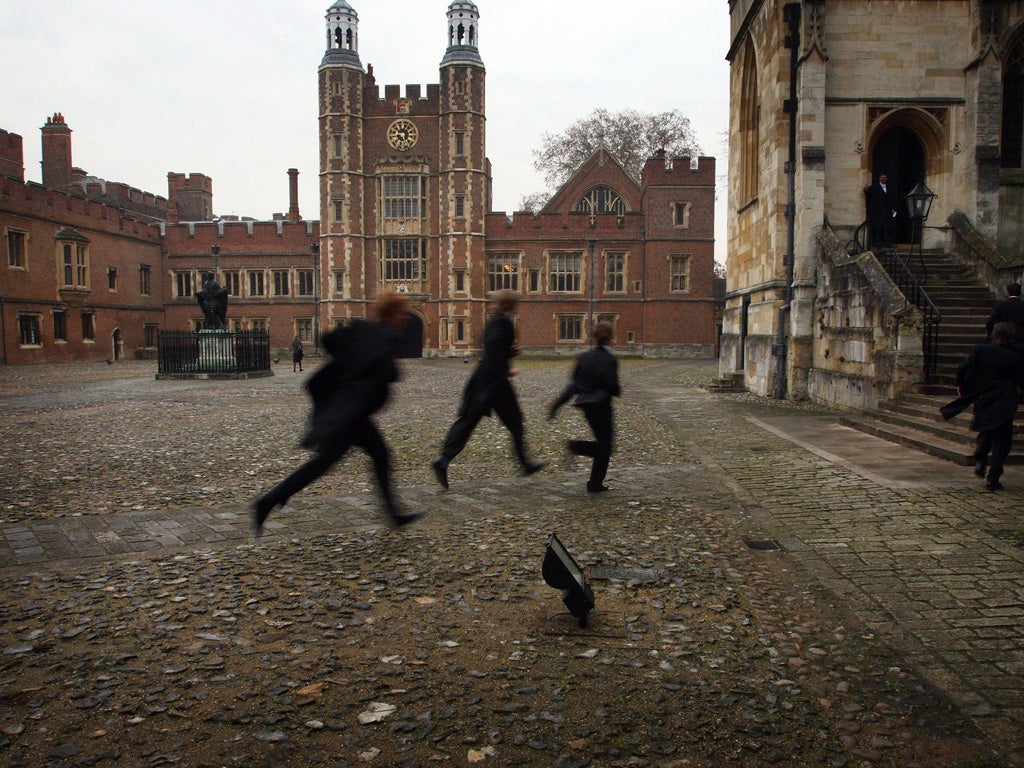Private schools should be open to all
Pupils would be selected on academic merit, rather than their parents' ability to pay.

Your support helps us to tell the story
From reproductive rights to climate change to Big Tech, The Independent is on the ground when the story is developing. Whether it's investigating the financials of Elon Musk's pro-Trump PAC or producing our latest documentary, 'The A Word', which shines a light on the American women fighting for reproductive rights, we know how important it is to parse out the facts from the messaging.
At such a critical moment in US history, we need reporters on the ground. Your donation allows us to keep sending journalists to speak to both sides of the story.
The Independent is trusted by Americans across the entire political spectrum. And unlike many other quality news outlets, we choose not to lock Americans out of our reporting and analysis with paywalls. We believe quality journalism should be available to everyone, paid for by those who can afford it.
Your support makes all the difference.
Ask yourself this question: Is it right that only those who can afford to pay high fees can get their children into the country’s most academically exclusive and top performing private schools? If the answer is no – as mine would be, then you have to ask yourself another question: what are you going to do about it?
Decades ago, the answer would be simple in Labour circles. You would abolish the independent schools – thus giving an incentive to high earners to pay more taxes to go towards improving state schools. That, though, is not going to happen and we need to consider Sutton Trust education charity chairman Sir Peter Lampl’s plan for “open access” private schools against that background.
Sir Peter already has 80 independent schools – including Westminster and Manchester Grammar – pledging their support for his scheme, under which pupils would be selected for these already academically selective schools totally on academic merit rather than ability to pay.
Addressing the Headmasters’ and Headmistresses’ Conference – the body which represents most of the country’s top public schools – in Belfast, he pointed out that his plan would not involve any increase in the amount of selection. The schools are already selective. All you would be doing is opening up those selective places to all comers.
As to the cost, he argues it would be cheaper to subsidise the places of the poorer pupils who get there on merit than it would be to pay for a state education for the school’s entire intake. To allow 30,000 pupils access under this scheme, he said, would cost £180 million – not easy to find in these times of austerity but a relative drop in the ocean compared with an overall education budget running into billions of pounds.
The obvious drawback to the plan is that it would take bright pupils away from state schools – thus making it more difficult for them to attain high standards of performance. It will, but will the number of pupils they will be giving up be enough to make that much of a difference to a school’s ability to succeed?
Some of those 80 schools who have signed up to support Sir Peter’s “open access” are pessimistic as to whether it will ever see the light of day. They think it will flounder on the selection issue. Both of our two main political parties are a bit ambivalent on that issue already. The Conservatives, who face pressure from their grass roots to increase selection, are happy to stick with the status quo of 164 remaining state grammar schools but no more. Labour, who face the opposite pressures, are in the same boat.
While we are caught in this no man’s land, does it not make sense to give Sir Peter’s proposal serious consideration rather than just carry on whingeing about the iniquity of the situation?
Join our commenting forum
Join thought-provoking conversations, follow other Independent readers and see their replies
Comments